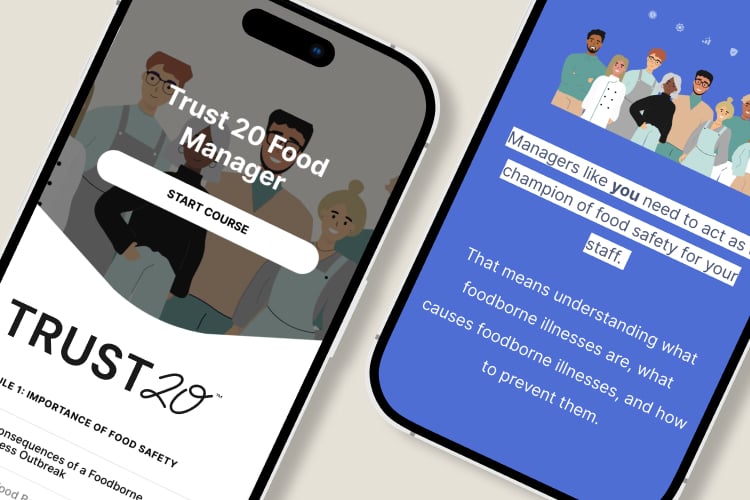Last updated November 21, 2025
Trust20 is pleased to announce the official launch of two major food safety products: the Certified Food Protection Manager (CFPM) Exam and the Food Protection Manager Training (now eligible for continuing education credits).
There are two ways to interact with Trust20’s food manager products, making it easy for operators, managers, and persons in charge like you to choose the road to food safety certification that’s best for you.
Navigate to the following sections to learn more:
Food Protection Manager Training
Why You Need Food Safety Trainings
CFPM Exam
The CFPM Exam offers a streamlined path to certification for experienced professionals. It allows managers to demonstrate their skills and knowledge through a secure, online platform.
Key Features:
-
Accreditation: The exam is accredited by the American National Accreditation Board (ANAB)-Conference for Food Protection (CFP).
-
Remote Proctoring: Administered by Meazure Learning, the exam utilizes online remote proctoring. This allows users to book sessions that fit their specific schedules without visiting a physical testing center.
-
Immediate Results: Candidates receive their pass/fail results immediately upon submitting the exam.
Food Protection Manager Training
The Food Protection Manager Training (now eligible for continuing education credits!) is designed for new managers, those needing to complete a mandatory training course, or professionals seeking a refresher before certification.
Key Features:
-
Flexibility: The course is fully accessible via laptop, tablet, or mobile device. Users can start, stop, and review content as needed.
-
Interactive Learning: The curriculum uses digestible modules and real-life scenarios to improve information retention.
-
Content Coverage: The training consists of ten interactive modules covering threats to food safety, training approaches for food handlers, and food safety management systems.
Note: This course results in a certificate of completion. While developed independently of the CFPM exam, it serves as excellent preparation for the certification experience.
Why You Need Food Safety Trainings
The World Health Organization (WHO) estimates that 600 million–almost one in ten people globally–fall ill after eating contaminated food, and 420,000 die each year.1 This staggering number is one of many reasons that operators, managers, and other leaders in foodservice require a deep knowledge of food safety.
Trust20 created our food manager products to make earning your CFPM credentials more approachable throughout your foodservice career. The CFPM exam is a straightforward way to sit for a testing session–without needing to find an in-person proctor–and find out your results immediately after you submit your exam.
The Food Protection Manager Training consists of ten interactive modules that help managers and shift leaders learn about threats to food safety, how to approach training for food handlers on their team, Food Safety Management Systems, and much more.
Stephanie Russell, General Manager of Trust20, said, “Trust20 wants to see a foodservice industry that is respected, well-rounded, and knowledgeable. We’re excited about bringing certification into our product offerings because it means we can support people in yet another stage of their foodservice careers.”
You can now purchase access to Trust20’s Certified Food Protection Manager (CFPM) exam for $90 and the Food Protection Manager Training for $90 at https://trust20.co/food-manager.
In addition to our food manager products, Trust20 also offers an ANAB-accredited Food Allergy Certificate training and an ANAB-accredited Food Handler Certificate training.
Sources:
- WHO: Food safety





.png)

.png)
